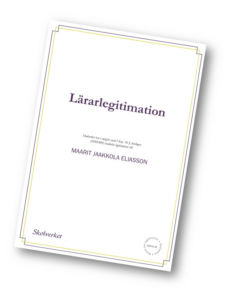I have been teaching my entire adult life; I started as a media teacher at an upper secondary school when I turned 20. Still, I have always strictly identified myself as a media, journalism and communications teacher. Recently, however, I have discovered a new dimension in my teacher’s identity – the linguistic side. I can with all confidence say: yes, I’m, indeed, a language teacher! On paper.
When I took my teacher’s education in Finland around 2005, I received the teacher’s eligibility in media subjects and German language. However, my specialization and primary interest was in media education, and I did my practical internship in social sciences instead of language studies. Nevertheless, the fact that I had taken another Master’s degree in German Philology formally made me a teacher in German. I have never really taught German. (Except one university course in German language history, Deutsche Sprachgeschichte, that I lectured at the University of Tampere at the age of 22 – which is, I guess, another story…)
In Sweden, because of my newly aroused interest in the national minorities, I got seriously interested in theories of bi- and multilingualism, second language learning and teaching, as well as language policies and planning. The power relations between majority and minority societies also captured my interest.
 In my work for the national minority policies and practices, I constantly encountered the practical questions of how to arrange bilingual education or how to foster bi- or multilingual children, which are not simple questions of opinion but need visions grounded in research. People around me were casually referring to Cummins and García and Gibbons and Skutnabb-Kangas, or to the language interdependency hypothesis or translanguaging or semilingualism or linguicism. These references were also frequent when I became a bilingual parent ambassador in Sweden for the EU project PeACH (Preserving and Promoting Europe’s Cultural and Linguistic Heritage through Empowerment of Bilingual Children and Families).
In my work for the national minority policies and practices, I constantly encountered the practical questions of how to arrange bilingual education or how to foster bi- or multilingual children, which are not simple questions of opinion but need visions grounded in research. People around me were casually referring to Cummins and García and Gibbons and Skutnabb-Kangas, or to the language interdependency hypothesis or translanguaging or semilingualism or linguicism. These references were also frequent when I became a bilingual parent ambassador in Sweden for the EU project PeACH (Preserving and Promoting Europe’s Cultural and Linguistic Heritage through Empowerment of Bilingual Children and Families).
Accordingly, my thirst for knowledge made me attend classes in teacher’s education in the national minority language Finnish at Stockholm University, which has the governmental assignment to educate Finnish-language teachers in Sweden. Even if I only took half of the classes, which make up 30 ECTS, and got the rest validated because of my previous studies and experience, it was a genuinely interesting experience to learn how the Finnish language is conceived of in Sweden. Children can receive “mother tongue” tuition (modersmålsundervisning) at school in it, but in practice it is a second language for the most pupils, and as pre-knowledge is no requirement, many children are learning it as if it was a foreign language.
After this experience, I enrolled on the study programme of Swedish as a second language (SVA, svenska som andraspråk) at Linnæus University. These courses didn’t only complement and dovetail with my contextual knowledge about multilingually oriented sociolinguistics, but I also got to delve into the systemic-functional grammar, which was the prevailing orientation at the department (a very mixed blessing, if you ask me). Nevertheless, as my German studies had pretty much followed the generative grammar of Noam Chomsky, I was glad to be informed about how M.A.K. Halliday’s ideas are (or are not) implemented at schools. As a result of my studies, which eventually went up to 50,5 ECTS, I also got the eligibility of teaching Swedish as a second language at Swedish schools, including SFI (svenska för invandrare, Swedish for immigrants).
Teacher’s eligibility assigned by the Swedish Agency of Education means that I am, now, officially a teacher in Finnish and Swedish as a second language in Sweden, besides being an eligible teacher in German in Finland. Is it upskilling or reskilling? As an academic with the university as my home, I honestly don’t think I will have any realistic possibilities to teach languages at school – but, instead, I will definitely use my knowledge in the contexts of academic research, practices and policies of media pedagogy and development in future. At the end of the day, it’s all about communication: linguistic education very powerfully contributes to increased knowledge about how messages are created, mediated and received.

Great reading, laudable experience. By publishing this article, you are already teaching others. What is more interesting is the reality of someone having to learn a mother tongue a second language in a foreign country! Thanks for sharing.